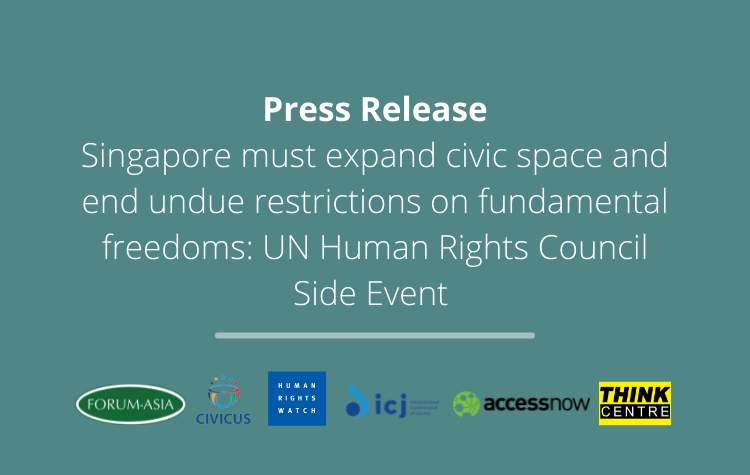(Bangkok/Geneva, 30 September 2021) – Amidst emerging threats to civic space, representatives from civil society called on Singapore’s Government to abide by its international legal obligations and commitments to respect fundamental freedoms in a Human Rights Council side event held on 29 September, a day before the adoption of the outcomes from Singapore’s Universal Periodic Review (UPR).
The event was organised by the Asian Forum for Human Rights and Development (FORUM-ASIA), Access Now, CIVICUS: World Alliance for Citizen Participation, Human Rights Watch, International Commission of Jurists (ICJ) and Think Centre during the 48th session of the UN Human Rights Council.
Key Issues Discussed
Speakers highlighted the violations and continuing threats to fundamental freedoms and civic space in Singapore, and discussed opportunities to change its course through recommendations to the government and the international community. Singapore’s civic space is rated as ‘obstructed’ by the CIVICUS Monitor, for its intimidation of civil society, activists and journalists.
‘Despite its purported commitment to uphold civic space made during the review of its UPR at the Human Rights Council, the government has persistently failed to address unwarranted restrictions on the rights to the freedoms of peaceful assembly, association and expression. There is a clear pattern of the continuous use of restrictive laws to silence dissent, targeting human rights defenders, political opposition and the media,’ said Cornelius Damar Hanung, CIVICUS Advocacy and Campaigns Officer for Asia.
In Singapore’s third cycle of the UPR, several states called on the Singapore government to revise its laws and practices to bring them in line with international human rights standards. However, the Government of Singapore has continued to curtail its people’s ability to express dissent and other comment on issues of public importance through restrictive laws including defamation, the Protection Against Online Falsehoods and Manipulation Act (POFMA), the Public Order Act and the Administration of Justice (Protection) Act.
‘While Singapore has accepted recommendations to ensure that freedom of opinion, expression, and peaceful assembly are protected, laws that violate international standards remain on the books, and the government continues to use them against the country’s few remaining dissenting voices,’ said Linda Lakhdhir, Asia legal advisor at Human Rights Watch.
The speakers also raised new threats to freedom of expression. On 13 September 2021, the Parliament tabled the Foreign Interference (Countermeasures) Bill (FICA), which will provide the Minister of Home Affairs with a wide range of tools to target individuals who act ‘on behalf of a foreign principal’ and imposes onerous reporting obligations for those designated as ‘politically significant persons’. Civil society groups have argued that the bill’s vague provisions can be used to arbitrarily scrutinise and curtail their activities, promote censorship, and affect access to funding under an expansive reading of ‘public interest’.
‘The vague and overbroad language of the FICA Bill means it will likely be used to arbitrarily restrict the rights to freedom of expression, information and association and the right to privacy. It is also deeply troubling that the Bill attempts to curtail the role of courts to review the Government’s exercise of powers under the law, which would severely undermine the rule of law,’ said Daron Tan, ICJ Legal Consultant.
Kirsten Han, an independent journalist running the newsletter We, The Citizens surveyed the adverse impact of this draft law. ‘There are no binding reassurances within the FICA that it will not be used against dissenting voices in Singapore. Unfortunately, past experience has shown us that the government does not hesitate to use ambiguous and overly broad legislation to stifle activism and independent journalism,’ said Han.
Participants and speakers at the side event highlighted the long-standing censorship that has been prevalent in Singapore, and the difficulty of raising human rights issues because of fear of reprisals. The FICA bill will only serve to worsen the situation and compromise the ability of civil society to reach out to the international community.
The speakers all emphasised the importance of the role of the international community in pushing Singapore to respect and guarantee fundamental freedoms. They raised the need for continuous engagement with civil society. They also called on States to continue to monitor the situation and to support human rights defenders in the country.
Singapore’s adoption of its UPR outcome is scheduled for 30 September 2021.
**
For the PDF version of this press release, click here.
About FORUM-ASIA:
The Asian Forum for Human Rights and Development (FORUM-ASIA) is a network of 82 member organisations across 23 countries, mainly in Asia. Founded in 1991, FORUM-ASIA works to strengthen movements for human rights and sustainable development through research, advocacy, capacity development and solidarity actions in Asia and beyond. It has consultative status with the United Nations Economic and Social Council, and consultative relationship with the ASEAN Intergovernmental Commission on Human Rights. The FORUM-ASIA Secretariat is based in Bangkok, with offices in Jakarta, Geneva and Kathmandu. www.forum-asia.org
For further information, please contact:
- East Asia and ASEAN Programme, FORUM-ASIA, [email protected]
For media inquiries, please contact:
- Melissa Ananthraj, Communication and Media Programme, FORUM-ASIA, [email protected]



